Related Research Articles
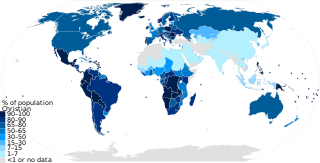
Christendom historically refers to the "Christian world": Christian states, Christian-majority countries and the countries in which Christianity dominates, prevails, or is culturally intertwined with.
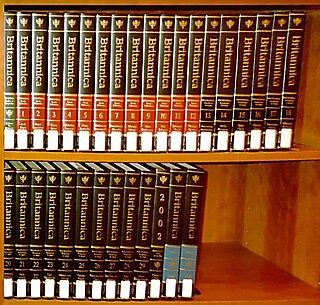
An encyclopedia, encyclopædia, or encyclopaedia is a reference work or compendium providing summaries of knowledge either from all branches or from a particular field or discipline. Encyclopedias are divided into articles or entries that are often arranged alphabetically by article name and sometimes by thematic categories. Encyclopedia entries are longer and more detailed than those in most dictionaries. Generally speaking, encyclopedia articles focus on factual information concerning the subject named in the article's title; this is unlike dictionary entries, which focus on linguistic information about words, such as their etymology, meaning, pronunciation, use, and grammatical forms.
The term Judeo-Christian is used to group Christianity and Judaism together, either in reference to Christianity's derivation from Judaism, Christianity's borrowing of Jewish Scripture to constitute the "Old Testament" of the Christian Bible, or due to perceived parallels or commonalities in Judaeo-Christian ethics shared by the two religions, such as the 10 commandments. The Jewish Tradition of atonement has been borrowed by Christians and circumcision is a common Jewish tradition among Evangelicals.

Otto Pfleiderer was a German Protestant theologian. Through his writings and his lectures, he became known as one of the most influential representatives of liberal theology.
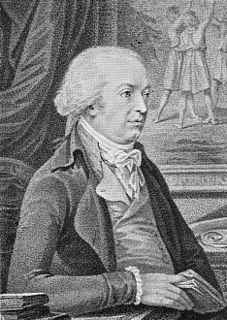
Johannes von Müller was a Swiss historian.
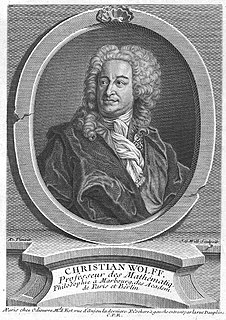
Christian Wolff was a German philosopher. Wolff was the most eminent German philosopher between Leibniz and Kant. His main achievement was a complete oeuvre on almost every scholarly subject of his time, displayed and unfolded according to his demonstrative-deductive, mathematical method, which perhaps represents the peak of Enlightenment rationality in Germany.

Christian August Crusius was a German philosopher and Protestant theologian.
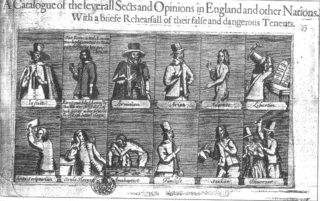
English Dissenters or English Separatists were Protestant Christians who separated from the Church of England in the 17th and 18th centuries.

Liberal Christianity, also known as liberal theology, is a movement that interprets Christian teaching by taking into consideration modern knowledge, science and ethics. It emphasizes the importance of reason and experience over doctrinal authority. Liberal Christians view their theology as an alternative to both atheistic rationalism and theologies based on traditional interpretations of external authority.
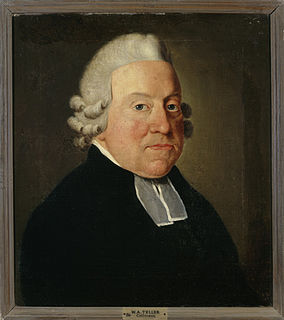
Wilhelm Abraham Teller was a German Protestant theologian who championed a rational approach to Christianity.
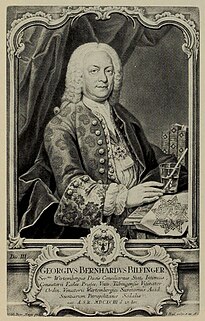
Georg Bernhard Bilfinger, German philosopher, mathematician and statesman, son of a Lutheran minister.

Salomo Glassius was a German theologian and biblical critic born at Sondershausen, in the principality of Schwarzburg-Sondershausen.

Lutheranism as a religious movement originated in the early 16th century Holy Roman Empire as an attempt to reform the Roman Catholic Church. The movement originated with the call for a public debate regarding several issues within the Catholic Church by Martin Luther, then a professor of Bible at the young University of Wittenberg. Lutheranism soon became a wider religious and political movement within the Holy Roman Empire owing to support from key electors and the widespread adoption of the printing press. This movement soon spread throughout northern Europe and became the driving force behind the wider Protestant Reformation. Today, Lutheranism has spread from Europe to all six populated continents.

Lutheran orthodoxy was an era in the history of Lutheranism, which began in 1580 from the writing of the Book of Concord and ended at the Age of Enlightenment. Lutheran orthodoxy was paralleled by similar eras in Calvinism and tridentine Roman Catholicism after the Counter-Reformation. Lutheran scholasticism was a theological method that gradually developed during the era of Lutheran Orthodoxy. Theologians used the neo-Aristotelian form of presentation, already popular in academia, in their writings and lectures. They defined the Lutheran faith and defended it against the polemics of opposing parties.
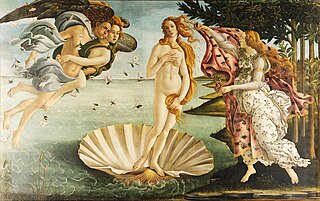
With the rediscovery of classical antiquity in the Renaissance, the poetry of Ovid became a major influence on the imagination of poets and artists, and remained a fundamental influence on the diffusion and perception of classical mythology through subsequent centuries. From the early years of the Renaissance, artists portrayed subjects from Greek and Roman mythology alongside more conventional Christian themes. Among the best-known subjects of Italian artists are Botticelli's Birth of Venus and Pallas and the Centaur, the Ledas of Leonardo da Vinci and Michelangelo, and Raphael's Galatea. Through the medium of Latin and the works of Ovid, Greek myth influenced medieval and Renaissance poets such as Petrarch, Boccaccio and Dante in Italy.

Christianity is the largest religion in Europe. Christianity has been practiced in Europe since the first century, and a number of the Pauline Epistles were addressed to Christians living in Greece, as well as other parts of the Roman Empire.
Nils Wallerius was a Swedish physicist, philosopher and theologian. He was one of the first scientists to study and document the characteristics of evaporation through modern scientific methods. He was also among the first and more notable followers of the philosophies of German philosopher Christian Wolff (1679–1754).

Martin Luther University of Halle-Wittenberg, also referred to as MLU, is a public, research-oriented university in the cities of Halle and Wittenberg in the State of Saxony-Anhalt, Germany. MLU offers German and international (English) courses leading to academic degrees such as BA, BSc, MA, MSc, doctoral degrees, and Habilitation.
Catholicism and Deism are two theologies that have opposed each other in matters of the role of God in the world. Deism is the philosophical belief which posits that although God exists as the uncaused First Cause, responsible for the creation of the universe, God does not interact directly with that subsequently created world. As deism is not organized, its adherents differ widely in important matters of belief, but all are in agreement in denying the significance of revelation in Catholic Scripture and Tradition. Deists argue against Catholicism by either, only considering Scripture to be a helpful moral tool, or denying: its divine character, the infallibility of the Church and Traditions, and the validity of its evidence as a complete manifestation of the will of God. Deism is first considered to have manifested itself in England towards the latter end of the seventeenth century.
References
- ↑ Nuttall
- ↑ Nationalencyklopedin
- ↑ Britannica